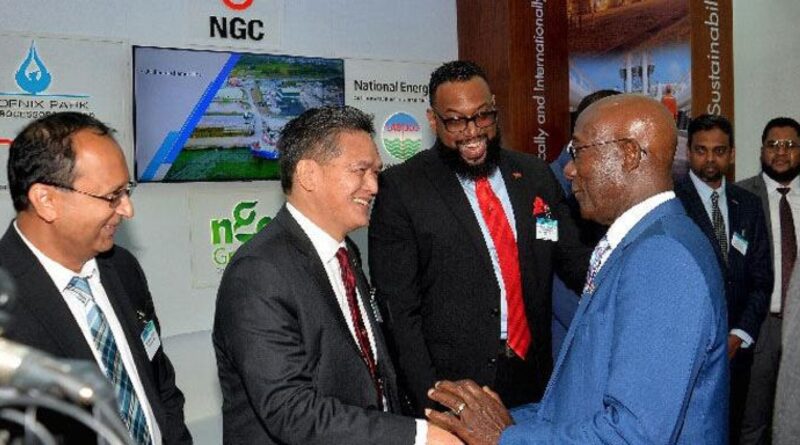Loquan: Next four years critical
WHAT the country does in the next four years will be critical while it waits for the Manatee and Dragon deals to materialise, president of the National Gas Company Mark Loquan has said.
Loquan made the comments as the issue of the energy transition and energy security took centre stage in discussions at this year’s Trinidad and Tobago Energy Conference.
“When we talk about energy transition and energy security we are not only talking about Trinidad and Tobago …because we are supplying a global trade,” Loquan said.
Loquan made the comments on the first day of the three-day conference at the Hyatt Regency Hotel, Port of Spain.
According to Loquan, “we are at a very critical juncture where we don’t yet have the materialisation of Manatee and Dragon deal until the next four years or so.”
Highlighting the decline in production as a major issue, Loquan said, “the decline is so I think that’s the monster in the room, so you will have a lot of small developments happening, a lot small onshore – they work on optimisation……we are at a time period 2024 – 2028 where we are trying to keep a plateau.”
With an estimated decline of 25%, he noted “2024 to 2028 is sort of a struggle to stay where you are…because we don’t have the big suppliers of Manatee, and Dragon deal …. we have about four years of fighting decline.”
He believes a few proactive steps can be taken between 2024 and 2028 in the meantime, saying “we look at a few areas…the technical collaboration across the value chain has to improve, we formed a team that right now working with upstream but we have to extend that to downstream and energy, there is a power steering committee, because obviously “our demand for power has been going up.” Recalling after the blackout in 2022, “we realise there is a lot of potential in terms of keeping your combined cycle plants running and being …much more energy efficient.”
However, he noted on “the demand side for energy which is energy efficiency, there is a lot more that can happen there …there are policies, there are codes, their standards, legislations, there is best practices, there is education that will result in us using the best energy at the end of the day, we are not there, we have been working in the background but we are not there.”
According to the NGC’s president, “Renewable energy we have the solar plant coming on that going to save some molecules but not a tremendous amount….so the energy efficiency demand side is going to be quite important in the next four years, so I hope there a lot more conversation in that space.”
“On the supply side, you would see the smaller fields, onshore, marginal fields, renewable fiscal policies and incentives and we need to accelerate from the ground …. while at the same time we recognise that the bigger guys obviously use the smaller operators or can use smaller operators to accelerate the gas supply,” Loquan said.
Mentioning that state companies are working together, for instance, Heritage Petroleum, which can look at onshore and buy effective gas, he said, in the meantime, we do need to bring new suppliers on.
He added that there needs to be a regional gas strategy “there is a broader regional strategy required. We heard about collaboration and acceleration that is critical to our processes, and off course we are… increasing optimize production.” He said that there a lot still to be done, stating that between 2024 and 2028 will be a critical period to navigate.
Asking how do we get to 2.0, “we have been doing a lot of stuff in Trinidad already, we have been working on CNG, we do have energy efficiency initiatives …… he said we need to ensure that we do have a different mechanism where we can deliver, allocate capital to green initiative, to clean energy and make sure that those investments could be local, could be regional, could be international.”
Loquan stressed that in the immediate timeframe, while we move on to renewable and get investment to work, focusing on research and development is crucial. Endorsing the importance of collaboration, he said there is potential is using each other a lot better “we had come from a silo type of approach but I would say the world now change to the point where it gotten more critical, so we have to be more agile…we do need to accelerate action.”
“The concept 2.0 is basically cleaning what we have, not getting rid of it, at the same being more efficient with what we are using, and at the same time getting into new areas locally and internationally: renewables, carbon capture, and it may not only be here in Trinidad,” said Loquan.

